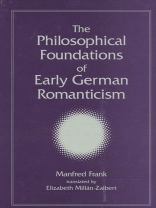Often portrayed as a movement of poets lost in swells of passion, early German Romanticism has been generally overlooked by scholars in favor of the great system-builders of the post-Kantian period, Schelling and Hegel. In the twelve lectures collected here, Manfred Frank redresses this oversight, offering an in-depth exploration of the philosophical contributions and contemporary relevance of early German Romanticism. Arguing that the early German Romantics initiated an original movement away from idealism, Frank brings the leading figures of the movement, Friedrich Schlegel and Friedrich von Hardenberg (Novalis), into concert with contemporary philosophical developments, and explores the role that Friedrich Hölderlin and other members of the Homburg Circle had upon the development of early German Romantic philosophy.
قائمة المحتويات
Acknowledgments
Frequently Cited Texts and Abbreviations
Introduction: ‘What Is Early German Romanticism?’
Lecture 1. On Early German Romanticism as an Essentially Skeptical Movement: The Reinhold-Fichte Connection
Lecture 2. On the Historical Origins of Novalis’ Critique of Fichte
Lecture 3. On the Unknowability of the Absolute: Historical Background and Romantic Reactions
Lecture 4. On the Search for the Unconditioned: From Jacobi’s ‘Feeling’ to Schelling and Holderlin’s ‘Intellectual Intuition’
Lecture 5. On Holderlin’s Disagreement with Schelling’s Ich-Schrift
Lecture 6. On Holderlin’s Critique of Fichte
Lecture 7. On Isaac von Sinclair
Lecture 8. On Jakob Zwilling’s Uber das Alles
Lecture 9. On Novalis’ Pivotal Role in Early German Romanticism
Lecture 10. On Friedrich Schlegel’s Place in the Jena Constellation
Lecture 11. On the Origins of Schlegel’s Talk of a Wechselerweis and His Move Away from a Philosophy of First Principles
Lecture 12. On Schlegel’s Role in the Genesis of Early German Romantic Theory of Art
Notes
Glossary
Bibliography
Index
عن المؤلف
Manfred Frank is Professor of Philosophy at Eberhard Karls University in Tübingen, Germany. He is the author of many books, including
The Subject and the Text: Essays in Literature and Philosophy.
Elizabeth Millán-Zaibert is Assistant Professor of Philosophy at De Paul University. She is the coeditor (with Jorge J. E. Gracia) of
Latin American Philosophy for the Twenty-first Century: The Human Condition, Values, and the Search for Identity and translator of
The History of Philosophy in Colonial Mexico by Mauricio Beuchot.












